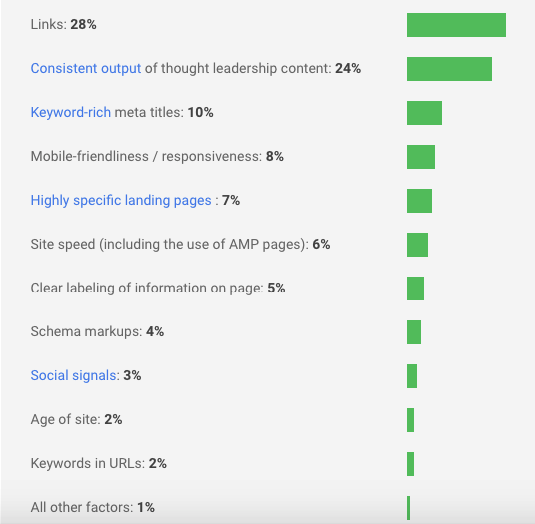Author: Neil Patel / Source: Quick Sprout Google can be really frustrating sometimes. If you’ve been in SEO for anytime at all, you know e
Google can be really frustrating sometimes.
If you’ve been in SEO for anytime at all, you know exactly what I’m talking about!
Google’s success and global search market dominance have largely hinged upon its ability to perpetually evolve and provide the best user experience possible.
As a result, SEO is in a constant state of flux.
It’s literally always changing!
But one thing that hasn’t changed is the fact that quality links are the foundation of nearly every successful SEO campaign.
Although many people have been predicting the demise of links as a primary ranking signal for years, link-building is still very much alive and quite well.
According to First Page Sage, links are still the number one ranking signal in Google’s algorithm in 2017.

As they point out,
inbound links have been the primary currency Google uses to determine its level of trust for a website since the search engine established itself in 1998.
It worked for them then, and it still works for them now.
So, yeah… Link-building is kind of a big deal, regardless of what the naysayers may think.
And this means one thing.
You need to have your link-building on lock.
Unfortunately, many link-building campaigns are full of holes due to misconceptions and misunderstandings as to what Google is really looking for.
It can be especially brutal for noobs, who are just getting their feet wet.
Here are some of the most common link-building mistakes SEO marketers make and how to resolve them.
Botching anchor text
The great anchor text debate has raged on for a few years now.
Okay, maybe that sounds overly epic, but employing anchor text is one of the most misunderstood aspects of link-building.
Back in the day, you could often outrank the competition by simply being obnoxious and going crazy with exact match anchor text (the keyword phrase you’re trying to rank for.)
But Google quickly discovered that way too many people were gaming the system and launched a counterattack with Penguin in 2012.

They tweaked their algorithm, and the sites that went overboard on exact match anchor text were penalized.
Of course, SEO marketers didn’t want to incur the wrath of Matt Cutts and his minions, so they did the only sensible thing.

They went the opposite direction.
Many people ceased to use exact match anchor text altogether.
And I can totally see why.
To be honest, I’m still a little sketched about using exact match anchors.
But here’s the thing. Doing anchor text the right way can be encapsulated in one word: natural.
If it’s natural, you’re good to go.
What exactly do I mean by natural?
You want to make sure you’re diversifying your anchor text and not going overboard with any particular format.
The different types of anchor text
When you break it down, there are six main types of anchor text:
- Exact match – Like I already explained
- Partial match – This contains the keyword phrase you’re trying to rank for but isn’t exact
- Branded – The name of your brand
- Naked URLs – This is the URL exactly how it appears in your browser
- Generic (also known as junk anchors) – Some examples would be “check this out” or “click here”
- LSI – This is latent semantic indexing, which is variations of your keyword.
If this still seems a little vague, here are examples provided by Ahrefs:

Speaking of Ahrefs… They performed some extensive research on anchor text fairly recently (mid-2016) to determine its impact on SEO.
There’s a ton of data, which can be a little confusing if you’re not an SEO nerd.
Allow me to give you the key takeaways.
First of all, anchor text continues to play an integral role in link-building, and SEO in general, and is unlikely to change any time soon.
Second, it’s completely true that you need to be careful when using keyword-rich…

COMMENTS